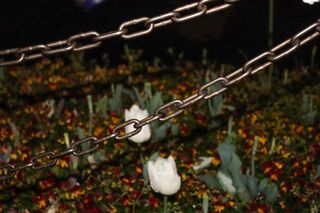Unconscious
What "Encanto" Tells Us About Our Chains
A Jungian and Marxist reading of Disney’s new animated feature.
Posted February 7, 2022 Reviewed by Gary Drevitch
Key points
- Encanto artfully explores the effects of psychic repression at individual and familial levels.
- Repression can also be seen in the film’s depiction of a restrictive social order.
- The film reminds that human flourishing is possible if we can break our chains and live in better alignment with our core humanity.

The best children’s movies operate at multiple frequencies, entertaining younger viewers while giving adults just enough food for thought. Encanto, Disney’s new animated film, asks its adult viewers to think about how repression operates at individual, familial, and societal levels.
The story
The film tells the story of the Madrigal clan, who live in a hidden fold of the Colombian Andes in a village called “Encanto” that is fueled by a mysterious magical force. Each member of the community is endowed with a discrete magical “gift” that becomes the singular basis of their identity and helps them serve the broader collective. When it comes time for the film’s main character—a young girl named Mirabel—to partake in a rite of passage to acquire her “gift," she is denied a magical inheritance. This troubles her grandmother, Alma, the family’s matriarch, who works obsessively to maintain Encanto through the shared labor of its magically-gifted members. An ever-burning candle symbolizes the fragile presence of the magic that binds the social order.
Though ungifted, Mirabel is uniquely able to sense the depletion of magic in Encanto. She notices massive cracks forming in the walls, ceilings, and floors and sees the candle flickering—a disturbing vision of decay and collapse. Soon, characters around Mirabel begin to sense their gifts diminishing, a loss felt most profoundly by her sister Luisa, whose super-human strength wanes. Seeking an explanation, Mirabel sneaks into a forbidden tower once occupied by her long-lost uncle Bruno. There, she finds a prophecy Bruno had fixed in emerald glass showing Encanto in ruins with Mirabel standing in the rubble.
When Mirabel relays the prophecy to Alma, her concerns are dismissed. She is told in no uncertain terms that “We don’t talk about Bruno." The young protagonist thus sets off on a harrowing journey in pursuit of her uncle, with whom she is now linked through their shared vision. She slips into a hidden passage, finding herself in a dark recess where she encounters Bruno, whose Cassandra-like “gift” had, a decade prior, led him to anticipate the impending loss of Encanto’s magic. The disruptive nature of this vision—a truth that could not be spoken in the Madrigal clan—ultimately caused Bruno to abandon the family and live in self-imposed exile in the village’s unseen crawl spaces. Like a phantom, he moves behind the walls, gazing out through cracks at a family incapable of integrating or adapting to what he has foretold.
As the prophecy unfolds and Encanto crumbles in ruin (the candle finally extinguished), Mirabel encounters a devastated Alma in a nearby river, who tearfully apologizes for running the family ragged in her quest to preserve the village’s magic. Bruno reappears after his decade-long banishment to the delight of Alma, who now embraces her son. As the film ends, the non-magical townspeople help rebuild the brick-and-mortar village from the ground up.
Jungian chains
Encanto carries a strong subtext of psychic repression and its costs. The film’s hit song ("We Don't Talk About Bruno") expresses quite powerfully how both individuals and families engage in suppression of inconvenient truths and traumas. Whereas Alma, as the domineering matriarch, represents the rigid controlling ego of Encanto, tightly managing reality while denying the inner drives of her family members to preserve the magical integrity of the village, Bruno symbolizes what Carl Jung called the collective unconscious: He is myth, intuition, the irrational, the shadow, archetypal energies, the stuff of prophecy and dreams.
Mirabel's "gift" is ultimately her freedom from the prescriptive identity/role ritually imposed by Alma, which fundamentally limits other family members. This fluidity enables her to traverse both conscious and unconscious realms (i.e., accessing Bruno’s forbidden lair), bringing the two into balance, a union symbolized by Alma’s ultimate embrace of her outcast son and his prophecy. This unification also serves to liberate other characters, such as Mirabel’s beautiful but unfulfilled sister Isabela, to break from their repressively prescribed roles, properly individuate, and achieve an elusive sense of wholeness (i.e., the Jungian Self).
Marxist chains
In addition to exploring these Jungian aspects of the psyche, the film can also be read as an allegory for capitalism. As is the case for the characters in Encanto who inherit a singular “gift” that must be harnessed for the good of the village, a capitalist economic system only values individuals insofar as they provide a skill, craft, or service that addresses a market need. For those of us who must sell our labor for a wage, it is natural to feel that such a system not only exploits us but also flattens our humanity.
Indeed, in the film, the strain on the characters who are instrumentally enlisted in the thankless task of maintaining the corporate structure of the village causes a gradual spiritual collapse resembling what Karl Marx termed "alienation." For Marx, alienation was an existential weariness that followed from the mechanistic and exploitative nature of work and corresponding loss of agency under a capitalist mode of production.
The character most exemplifying this dynamic is Mirabel’s hulk-like sister Luisa, who is overburdened by the strenuous labor she is required to carry out for the village. As the physical tasks mount for Luisa, she feels her power and passion ebbing away. Of course, we all feel this estrangement to some degree in our work lives: being asked to produce ever more value (often for the same or less wage) and often lacking creative control or autonomy within our jobs. Alma’s great revelation is not only that she has been psychically repressing essential truths to her family’s detriment, but that she has inadvertently been exploiting the gifts of each person and failing to treat them as self-determining human beings, i.e., ends in themselves.
“Pluck the living flower”
Marx famously exhorted his contemporaries to “throw off the chain and pluck the living flower.” Encanto reminds us that achieving greater psychic and material freedom can create conditions that enhance fulfillment, dignity, and joy. Doing so means being willing to plunge into sometimes dismal depths, to look deep into the pathologies in ourselves, our families, and the social order and pursue ways of living better aligned with our core humanity and a vision of the good.




